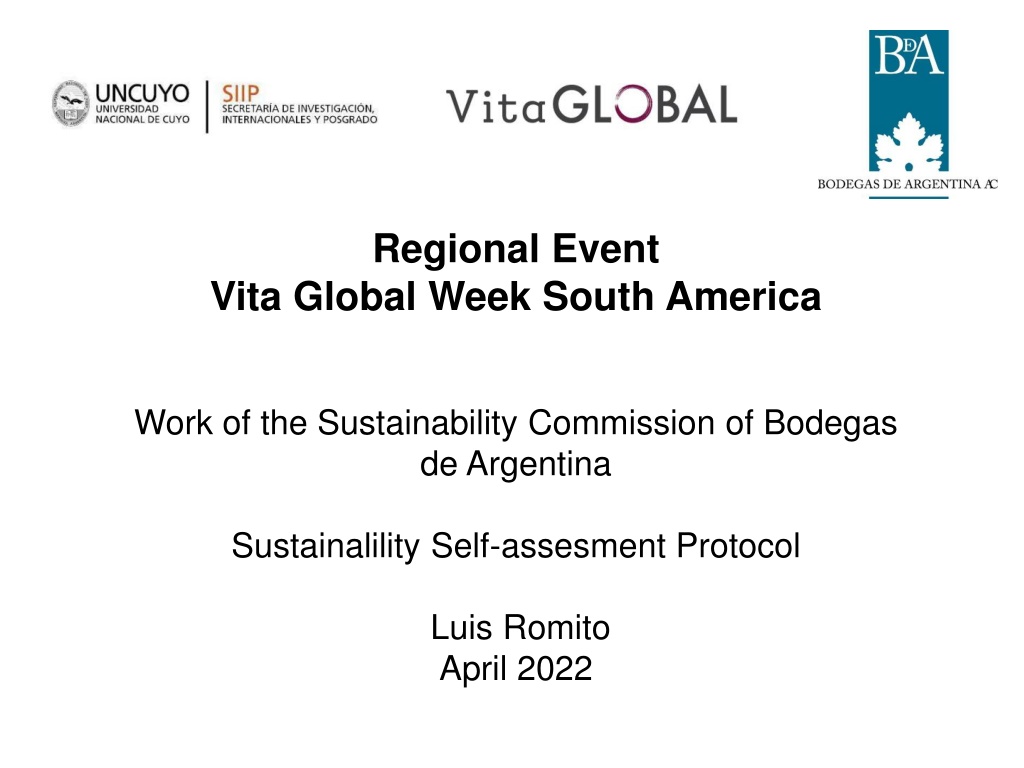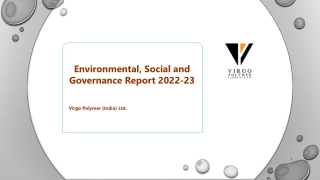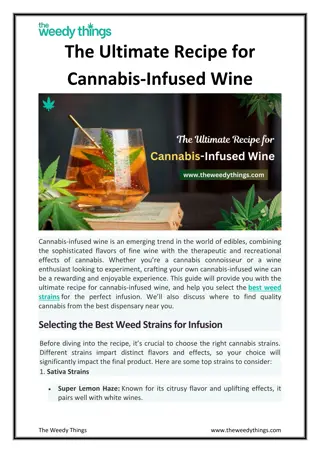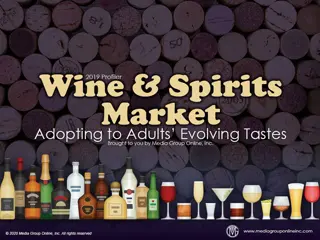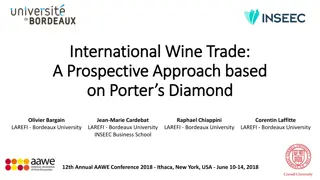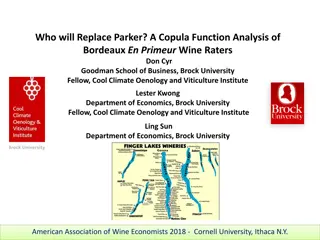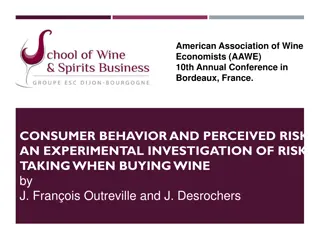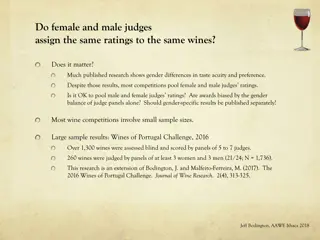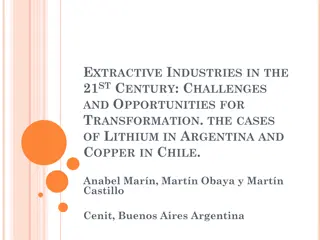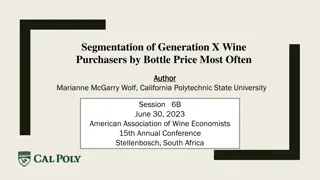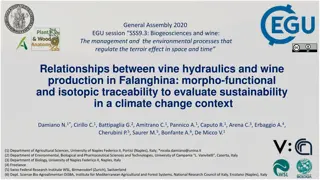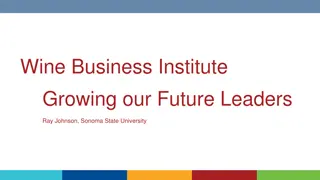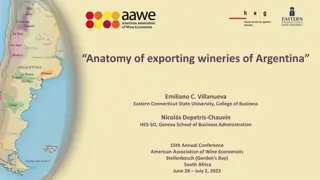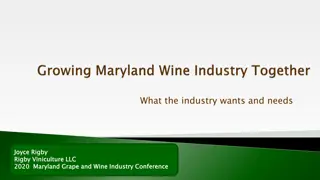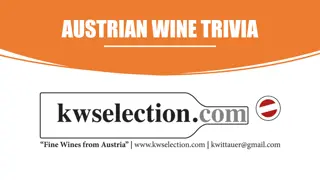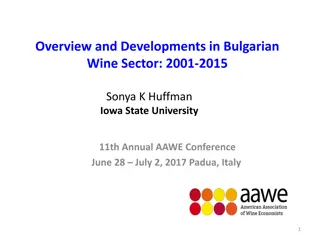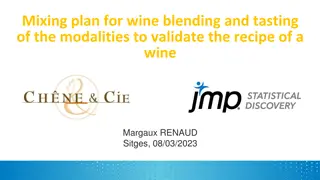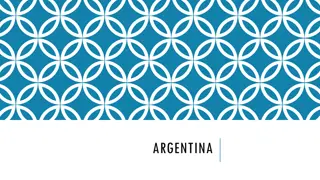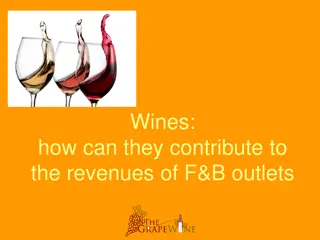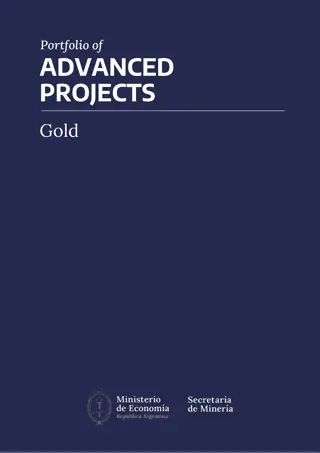Sustainability Initiatives in Argentina's Wine Industry
Regional Event Vita Global Week in South America featured the work of the Sustainability Commission of Bodegas de Argentina and their Sustainability Self-assessment Protocol. The protocol covers various aspects including viticulture, soil management, water conservation, energy efficiency, and community relations. Bodegas de Argentina, the largest business wine-producing institution in Argentina, has made significant progress in implementing sustainable practices as evidenced by the increasing number of certified units over the years.
Download Presentation

Please find below an Image/Link to download the presentation.
The content on the website is provided AS IS for your information and personal use only. It may not be sold, licensed, or shared on other websites without obtaining consent from the author. Download presentation by click this link. If you encounter any issues during the download, it is possible that the publisher has removed the file from their server.
E N D
Presentation Transcript
Regional Event Vita Global Week South America Work of the Sustainability Commission of Bodegas de Argentina Sustainalility Self-assesment Protocol Luis Romito April 2022
Bodegas de Argentina (BAAC) is a business chamber which gathers the main Argentinian Wineries. Is Argentina's largest business wine-producing institution, and gathers 250 wineries from all the wine producing provinces, 70% of which are SMEs. BAAC has members in the Provinces of Salta, Catamarca, La Rioja, San Juan, Mendoza, Neuqu n, R o Negro, C rdoba and Buenos Aires. The sales of its associated wineries represent 75% of the domestic market. In the foreign market, the partners of Bodegas de Argentina export 90% of the bottled wines.
Sustainability Self Assessment Protocol Scope 1. Viticulture 2. Soil management 3. Vineyard water management 4. Pest management 5. Wine quality 6. Ecosystem management 7. Energy efficiency 8. Winery Water Conservation and Quality 9. Material Handling 10. Solid Waste Management 11. Sustainable preferred purchasing 12. Human Resources 13. Neighbors and Community 14. Air quality
Criteria for Soil Management 2.1 Knowing the soil. Physical properties. Physical parameters 2.2 Knowing the soil. Physical properties. Water infiltration, drainage and water holding capacity. 2.3 Knowing the soil. Chemical properties. Nutrients management 2.4 Knowing the soil. Soil Biological Fertility 2.5 Soil Management. Salinity and sodicity 2.6 Soil Management. Tillage 2.7 Soil Management. Cover crops and organic matter 2.8 Soil Conservation. Anthropic erosion. Wind erosion. 2.9 Soil Conservation. Anthropic erosion. Water erosion (rivers, rain), surface water diversions. 2.10 Soil Conservation. Soil diseases.
Sustainability Self Assessment Protocol Certified units to date: 113 (vineyards and wineries). 120 100 80 60 40 20 0 2015 2016 2017 2018 2019 2020 2021 2022
Sustainability Self Assessment Protocol Acknowledgments Instituto Nacional de Vitivinicultura Alko (Finland) has recognized the Protocol among the Green Choice Symbols, Systembolaget, the Swedish monopoly has established as a requirement to export wine to Sweden Mark & Spencer
Sustainability Self Assessment Protocol Update in progress, incorporating Sustainable Development Goals (SDGs) Alignment with BSCI Environmental footprint Ethics Transparency Integrity Gender Human Rights
Value Chain Program Launched in December 2017 with the initial objective of centralizing audits, reducing risks associated with food safety, quality, legality, authenticity, commercial transparency and sustainability of the entire supply chain of the Argentine wine industry, and promote continuous improvement in the entire supply chain of the sector, also achieving a benefit for consumers. In addition, the objective was to promote the certification of food safety management systems among suppliers endorsed by GFSI (BRC, IFS Food, FSSC 22000), environmental management and corporate social responsibility.
Value Chain Program 22 wineries participate in the program: The Program reaches more than 50 suppliers , some have already certified a GFSI protocol and others are on the way to implementation. 32 audits were conducted in 2018 30 in 2019 44 in 2020 44 in 2021 (despite the pandemic).
Wine Sustainability Guide Published by "The one planet network", United Nations.
Program to strengthen the sustainability of the Argentine wine sector Aimed at wineries from different national wine regions, for the implementation of the Sustainable Wine Production Guide, and strengthen their export capacity. It is based on a self-managed e-learning platform, developed by INTI, and is financed by the Consejo Federal de Inversiones The training will be given by the multidisciplinary and multi-institutional team that carried out the Guide and the training (FCA, INV, INTI, INTA and Bodegas de Argentina). The Project consists of two modules: Presentation of the digitization of the Guide for a sustainable production of the wine sector. Current. Tutored course under the e-learning format on wine sustainability concepts. Imminent launch.
OTHER ACTIONS Water resources In February 2020, the General Department of Irrigation promulgated Res 52/20 on effluents, which replaces 778/96, which includes our proposal. Study carried out with INTI on the reuse of alkaline effluents Agreement with Irrigation and EPRE to promote mini-hydroelectric plants Environmental footprint A methodological guide on environmental footprint is prepared in accordance with the regulations of the European Union
OTHER ACTIONS Carbon sequestration Workshops with Carbon Group and the Argentine Carbon Neutral Program on carbon footprint calculation, carbon sequestration projects by soils and design and implementation of an emissions compensation plan Workshops on renewable energy and energy efficiency Waste management. Composting Workshops Participation in the World Wine Trade Group
Regional Event Vita Global Week South America THANKS
